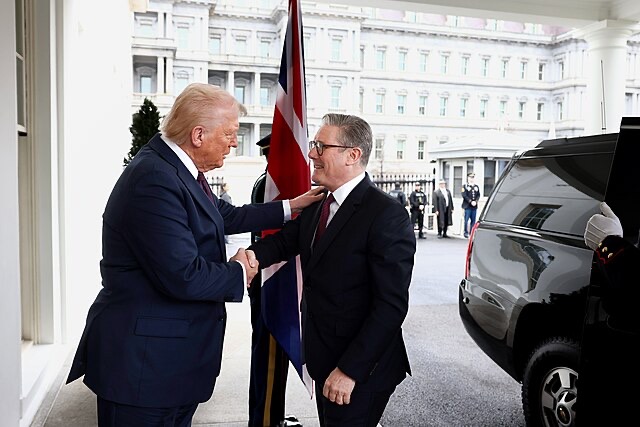Starmer’s Urgent Trade Mission
The UK is reportedly on the brink of signing a long-anticipated trade agreement with the United States, with Prime Minister Sir Keir Starmer’s administration scrambling to shield British car and steel manufacturers from the crushing impact of President Donald Trump’s reinstated tariffs. The deal, expected to be finalized within days, could bring significant relief to key UK sectors hit hard by 25% US tariffs.
The move is seen as an emergency effort by the Labour government to stabilize UK-US economic relations and lay the groundwork for Starmer’s larger Brexit “reset” strategy, which aims to recalibrate Britain’s place on the world trade stage after years of post-EU turbulence.
Why the Deal Matters Now
This agreement is more than just another trade deal. It’s a symbol of strategic diplomacy during a time of economic fragility. With British exports under fire and domestic manufacturers warning of job losses, the deal has become a high-stakes priority. If signed this week, it will be the first significant trade accord under Starmer’s leadership—and a powerful signal that his government intends to deliver swift, pragmatic solutions.
The Trade Deal – What’s on the Table?
Tariff Quotas for Cars and Steel
At the heart of the deal are targeted relief measures, including lower-tariff quotas on British steel and car exports to the US. These quotas would allow a specific volume of UK goods to enter the American market without facing the full 25% tariffs imposed by the Trump administration earlier this year.
For the UK’s luxury car sector—think Jaguar Land Rover—and steel hubs like Port Talbot and Scunthorpe, these quotas could mean the difference between survival and shutdown. According to trade officials, these “transatlantic exemptions” are tailored to shield Britain’s most vulnerable export categories.
UK’s Digital Tax and Agricultural Concessions
In exchange, Britain has reportedly agreed to scale back its digital services tax, which has long been a point of contention with Washington. The UK is also set to reduce tariffs on certain US agricultural products, although it remains adamant about not importing chlorinated chicken or hormone-treated beef—a stance that maintains public trust without fully conceding to American agricultural lobbyists.
Negotiators have also secured provisions to allow smoother customs procedures for British goods, including increased transparency on rules-of-origin standards that have hindered post-Brexit exports.
Trump’s Tariffs – The Trigger for Urgency
A 25% Blow to UK Manufacturing
President Donald Trump’s economic return has not come quietly. One of his earliest policy moves this year was the reinstatement of steep tariffs on foreign imports, particularly aimed at cars and steel. The UK was not spared. Almost overnight, British manufacturers faced a 25% tariff wall when exporting to one of their largest non-EU markets.
These tariffs immediately squeezed the profit margins of iconic British automakers and steel producers. In places like Birmingham and Teesside, factories that rely heavily on American buyers warned of looming layoffs. Industry bodies like Make UK and the British Steel Association lobbied the Starmer government to take urgent action before irreversible damage set in.
The situation created a perfect storm: industries already navigating post-Brexit customs red tape were suddenly saddled with financial penalties that could render them globally uncompetitive.
The Steel and Automotive Sector’s Struggle
The steel sector, which exports over 10% of its output to the US, has been especially vulnerable. Since Trump’s tariffs resumed, orders have slowed dramatically, and contracts have shifted to tariff-exempt suppliers in Europe and Asia. Meanwhile, UK carmakers, especially premium brands, reported a sharp decline in transatlantic sales.
These sectors are not just economic cornerstones—they’re deeply symbolic. They employ tens of thousands across the Midlands, Wales, and northern England. For Starmer, delivering relief isn’t just about trade; it’s about fulfilling election promises to restore prosperity to post-industrial Britain.
Starmer’s Brexit ‘Reset’ Strategy
Rebuilding Global Trade Ties
Since taking office, Starmer has made it clear that Brexit, while settled in law, remains unsettled in practice. His “Brexit reset” strategy aims to rebuild the UK’s global trading reputation, and that begins with repairing fractured relations with major partners like the US.
The US deal is one in a growing list of agreements Starmer’s team is fast-tracking. Recent successes with India and the Comprehensive and Progressive Agreement for Trans-Pacific Partnership (CPTPP) show a pattern: targeted diplomacy, focused sectoral relief, and quick implementation.
This isn’t about recreating EU-style market access but about building leaner, mutually beneficial pacts that deliver direct economic value.
What It Means for UK Industry
If this deal is signed as expected, it could offer immediate lifelines to thousands of UK businesses. More importantly, it sets a precedent: the UK is capable of securing bilateral deals with one of the world’s largest economies despite its post-Brexit isolation.
Analysts note that Starmer’s success here may also give him leverage with the EU, as he eyes closer alignment with Europe without rejoining the single market. A robust US deal could prove the UK still has economic clout and flexibility on the global stage.
Key Sticking Points and Compromises
Pharmaceutical Patents and Market Access
Despite the progress, not all negotiations have been smooth. One sticking point remains the pharmaceutical sector. The US is pushing for greater patent protections and broader access to the NHS procurement system for American drug firms. The UK, wary of “privatization by stealth,” is pushing back to protect public health interests.
Sources close to the talks suggest that both sides have agreed to defer these provisions to a secondary phase of negotiations, potentially revisiting the issue next year.
UK’s Stand on Food Safety and Hormone-Treated Imports
Food safety has always been a red line. The UK has refused to compromise on its ban on hormone-treated beef and chlorine-washed chicken—two contentious American agricultural exports. Public opinion in Britain remains strongly opposed to what many view as “lower standards” of food production.
Starmer’s team has reportedly held firm, insisting that while tariffs may ease, food quality and traceability will not.



